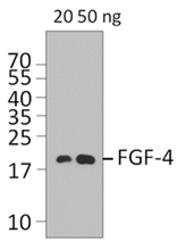Antibody data
- Antibody Data
- Antigen structure
- References [0]
- Comments [0]
- Validations
- Western blot [1]
Submit
Validation data
Reference
Comment
Report error
- Product number
- 677402 - Provider product page

- Provider
- BioLegend
- Proper citation
- BioLegend Cat#677402, RRID:AB_2565907
- Product name
- Purified anti-FGF-4
- Antibody type
- Monoclonal
- Antigen
- Partial human FGF-4 recombinant protein (54-206 a.a.) expressed in E. coli.
- Description
- FGF-4 was first identified as HST-1 gene by a NIH3T3 transforming assay. It belongs to the FGF family that includes 22 members (FGF1-FGF23). However, FGF15 has not been identified in humans. FGF-4 exhibits strong effects on many different cell types and tissues, and plays an important role in both embryogenesis and adult tissue stem cell development in a variety of organisms. FGF-4 can stimulate limb mesenchyme proliferation and can provide all the signals required for normal outgrowth and patterning of the limb. FGF-4 mRNA has been detected in the apical ectodermal ridge of the limb bud in day 11 and 12 embryos. FGF-4 is also involved in early heart development by supporting the proliferation and differentiation of precardiac myoblasts. In adults, FGF-4 is expressed in the testis and its overexpression results in enhanced spermatogenesis. FGF-4 is also a potent inducer of platelet production from megakaryocytes. FGF-4 expression has been detected in the brain at both neonatal and adult stages. FGF-4 can induce neural stem cell proliferation and neuronal differentiation. The diverse functions of FGF-4 are mediated by FGF receptors (FGFR) that contain an extracellular ligand-binding domain with three immunoglobulin-like domains. Like other FGFs, FGF-4 also binds to anionic glycosaminoglycans heparin and heparin sulfate with a high affinity. Heparin sulfate availability has been shown to regulate the binding between FGF-4 and its receptors. The role of FGF-4 in cancer has also been extensively investigated. FGF-4 is an angiogenic protein, and the amplification of FGF-4 gene has been found in many human tumors. It has been shown that FGF-4 is a potential target for the treatment of human testicular tumors.
- Reactivity
- Human
- Host
- Mouse
- Conjugate
- Unconjugated
- Antibody clone number
- 2D1C57
- Vial size
- 100 µg
- Concentration
- 0.5 mg/ml
- Storage
- 2°C-8°C
- Handling
- Ambient RT
No comments: Submit comment
Supportive validation
- Submitted by
- BioLegend (provider)
- Main image

- Experimental details
- 20 or 50 ng of human FGF-4 recombinant protein was resolved by electrophoresis, transferred to nitrocellulose, and probed with purified monoclonal anti-FGF-4 (clone 2D1C57) antibody. Proteins were visualized using a HRP conjugated anti-mouse-IgG secondary and chemiluminescence detection.
- Conjugate
- Unconjugated
 Explore
Explore Validate
Validate Learn
Learn Western blot
Western blot